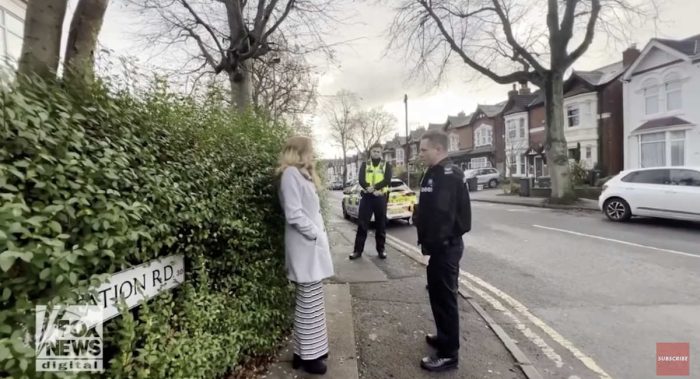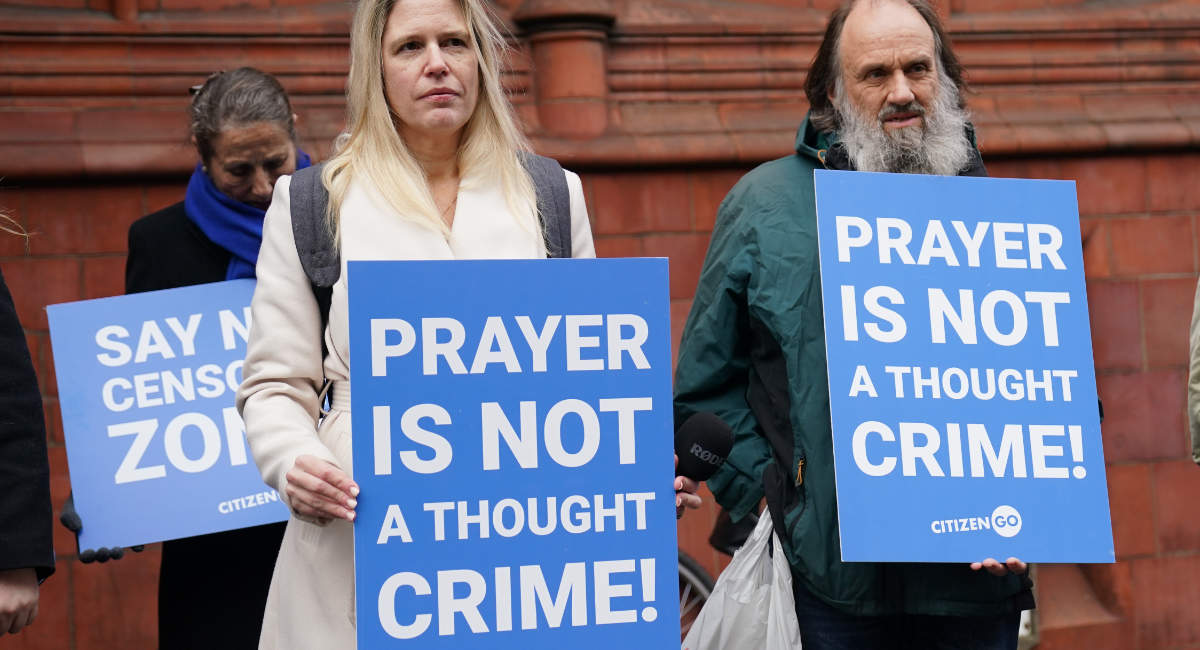Parliament members in Britain’s House of Commons approved legislation Tuesday that would prohibit a wide range of pro-life activity — including silent prayer — outside the country’s abortion facilities.
According to Catholic News Agency, the bill would create “buffer zones” of 150 meters (about 492 feet) around abortion facilities in England and Wales. Within those buffer zones “intimidation, harassment, or interference” is prohibited against anyone seeking or committing an abortion. Forbidden activity includes “influencing any person’s decision to access, provide, or facilitate the provision of abortion services,” even silent prayer. The law passed with a vote of 299-116.
Although several MPs introduced an amendment that would have exempted prayer and consensual conversation from being outlawed by the bill, that amendment failed to pass.

Isabel Vaughan-Spruce was arrested twice for silent prayer. Screenshot: Fox News Digital
“It is very disappointing that MPs have rejected even this modest amendment, which was trying to ensure that thoughtcrime was not enshrined in UK law. Introducing buffer zones already means that ordinary citizens will be branded criminals and subject to crippling financial penalties for witnessing peacefully and offering help to women in need,” said Alithea Williams, Public Policy Manager of the Society for the Protection of Unborn Children.
“This is not just an outrageous assault on civil liberties, it removes a real lifeline for women. Many children are alive today because their mother received help and support from a compassionate pro-life person outside a clinic. Many women feel pressured or coerced into having an abortion, and pro-life vigils give them options. Now their choices have been taken away.”
Countless women in the UK have expressed gratitude to pro-life sidewalk counselors. Isabel explained that she had arrived at a British Pregnancy Advisory Service facility to have an abortion, but met a woman from the Good Counsel Network, an organization that helps connect women to the resources they need in order to freely choose life, outside of that facility.
“She greeted me, offered me a leaflet and I decided to talk to her,” explained Isabel, who shared her story at Be Here for Me. “I was lost, I didn’t know what to do with the pregnancy. She asked me why I was there and I told her everything. She was like, ‘If there is any way I could get support for you, would that put you in a position where you felt you did not have to terminate the pregnancy’ and I said ‘Yes, if I am able to get the support, I do want to keep this baby’.”
The Good Counsel Network was able to find Isabel a home and she was able to keep her baby. After her baby was born, the organization helped to provide her with baby gear and financial support — “everything I needed to start my life all over again,” she said. “Not just for myself now but for my baby as well.”
Jeremiah Igunnubole, legal counsel for the ADF UK legal group, said on March 7, “Today’s vote marks a watershed moment for fundamental rights and freedoms in our country.”
ADF UK has been working with two individuals who were recently arrested for “thoughtcrime” for praying outside an abortion facility with a similar buffer zone law in place. Isabel Vaughan-Spruce and Father Sean Gough were charged in separate incidents for the very practice that this new law prohibits — praying silently. Though the charges for both were initially dropped, Vaughan-Spruce was arrested a second time on March 7, a day prior to the vote, again for silently praying in her head.
“Only three weeks ago, it was made clear by the court that my silent prayers were not a crime. And yet, again, I have been arrested and treated as a criminal for having the exact same thoughts in my head, in the same location,” she said in a statement Monday.
Igunnoble warns that this new law sets a dangerous precedent for future laws.
“Parliament had an opportunity to reject the criminalization of free thought, which is an absolute right, and embrace individual liberty for all. Instead, Parliament chose to endorse censorship and criminalize peaceful activities such as silent prayer and consensual conversation. Today it’s abortion. Tomorrow it could be another contested matter of political debate,” he said. “The principle remains that the government should never be able to punish anyone for prayer, let alone silent prayer, and peaceful and consensual conversation.”








